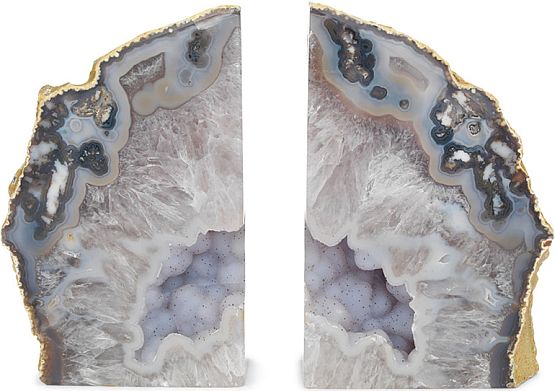|
 Blue and beige Brazilian agate bookends
Blue and beige Brazilian agate bookends
|
|
Consider
that mortality is just a
point of view.
Say
whut? No, wait: it's even worse than that actually.
Consider
that mortality is just a
belief system.
And to
get
this, focus for a
moment
here on what a
belief system
is, rather than on mortality itself. A
belief system
looks
at a subset of
the truth,
without
seeing
the
big
picture, yet it's convinced it
sees
the
big
picture.
In
transformation,
consider
mortality to be the bookends of a particular process.
The west of the pair of bookends is birth. The
east of the pair is
death.
And held upright between the two bookends are all the books ie the
totality of the multifarious
stories
comprising your life.
But ... (and here's the
question
you can and should
ask):
if there's one of a pair of bookends at the start of and at the end
of a life, then what's the
context
in which the pair of bookends occur? It's
Life itself,
coming and going and coming and going like waves rising and
breaking and rising and breaking, and all there really is, is the
ocean. Don't label this as "reincarnation" or the "afterlife".
That's more
belief.
It's just
Life itself
coming and going, coming and going.
Now
we and our little
egos,
don't always live that. Worse (to our own detriment) we mostly
don't like to. But if you can
step
outside of and around those
self-imposed
barriers
for just a
moment,
if you
can
see
the
context
to either side outside of and around the bookends which prop up our
life's
stories,
living life might
work
better when
experiencing
it that
way.
Really.
Werner
Erhard's
proposal that
who we really are
is
out-here
ie
who we really are
is all of it, would
account
for all this. You can verify his proposal by
creating
the distinction for yourself, then
sitting
in the
experience
of it until it becomes familiar and obvious ie familiarly
obvious. Your first take of the
experience
of
who we really are
out-here,
should
account
for everything that
shows up
ie for (here's a great distinction)
the showing.
But
look:
there's something that's
easy
to miss, and it's this: what if
being
all of it includes
being
all of it across all
time?
And that's when mortality is
discovered
to be just another
point of view
ie a
belief system.
Life comes. It goes. It comes again. Waves on the ocean. And the
tree leaves, and the ocean waves, and the
universe
peoples
(thank you
Alan).
|
 Blue and beige Brazilian agate bookends
Blue and beige Brazilian agate bookends